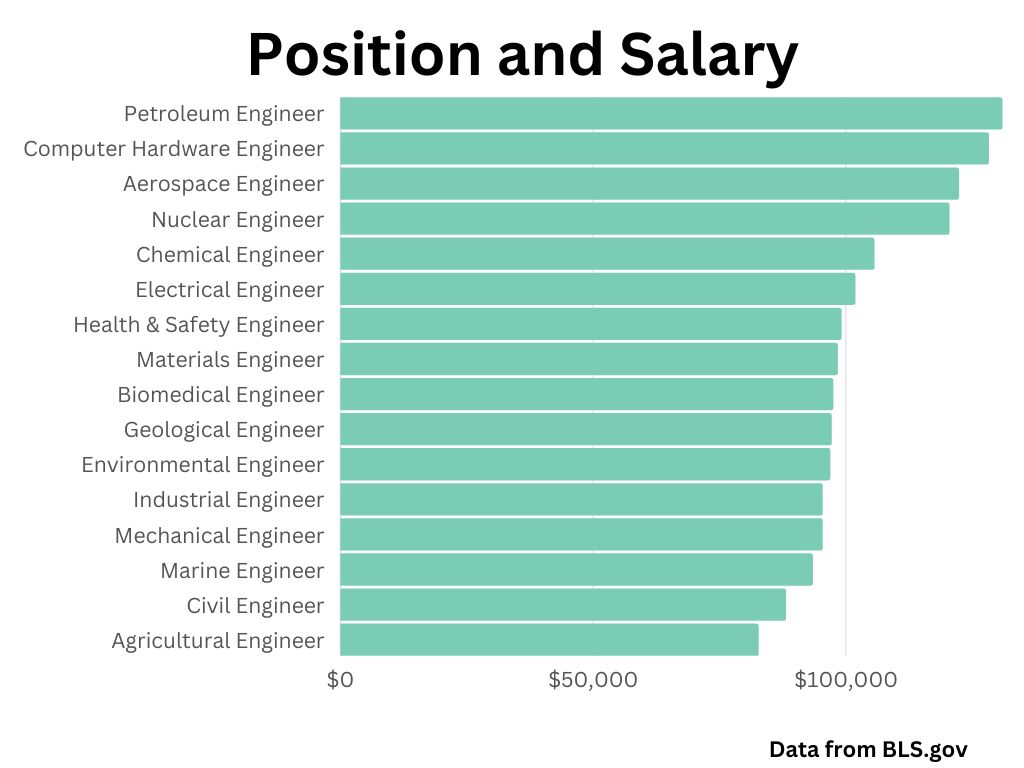2023 Guide to the Best Online Colleges for Engineering Degrees

Today, earning an engineering degree from an online college is a respectable, convenient way to begin a rewarding technical or managerial career. Sustainability, manufacturing, computer hardware design, petroleum engineering, biomedical engineering, and technical management are just a few of the disciplinary fields in engineering that will provide you with opportunities to work in industry, business, or government. If you’re considering earning your engineering degree online, look at our guide. We’ll explore the best online colleges and engineering degree programs that will put you on the right path to success.
What Makes an Online Engineering Degree High-Quality?
The best online colleges are regionally accredited. These schools will prepare you to enter the workforce or get you ready for graduate school. Worthwhile programs will be rigorous and well-regarded by professionals in the field. They will prepare you to acquire professional credentials and licensing or pursue a career in management.
When looking for engineering degrees online at any educational level, you’ll want to find reputable offerings that fit your needs. Your chosen online engineering program may adhere to a traditional timetable and curriculum or provide flexible or accelerated learning options that accommodate your schedule. Great online colleges for engineering bachelor’s or master’s degrees will have a solid academic reputation, proper accreditation, high student satisfaction, and provide good value for your money. They will also have affordable tuition and provide access to financial aid, academic advice, and career services.
Specializations for Engineering Degrees Online
Contemporary engineering has traditionally been divided into four branches: mechanical engineering, chemical engineering, civil engineering, and electrical engineering. Each branch includes several specializations or concentrations. Some educational authorities now include engineering management, industrial engineering, computer engineering, aerospace engineering, and geotechnical engineering as primary disciplines, while others classify them as subcategories of the four main engineering branches. Since all engineering disciplines are built upon the foundations of mathematics and physics as they apply to the physical world, there are many opportunities for disciplinary categories to overlap, yielding hundreds of different subtypes of engineering.
Civil Engineering
Civil engineering applies the foundational principles of math and physics to designing, building, operating, and preserving the roads, bridges, waterways, dams, airports, pipelines, railways, sewage systems, and other structures that make up the built environment. This discipline involves the construction of municipal public works and privately developed architecture. It includes various specializations, including materials science, structures, soils, and environmental science. Read on to familiarize yourself with the four main branches of engineering, then look at a sample of engineering specializations that may be available at the undergraduate and graduate levels.
Electrical Engineering
Electrical engineering is concerned with designing and implementing electric, electronic, and electromagnetic devices, equipment, and systems. Computer engineering, power engineering, microwave engineering, telecommunications, signal processing, and optical engineering are all subdisciplines of electrical engineering. Electrical engineers design computers, circuits, communication systems, control systems, photovoltaics, and many other devices intrinsic to modern life.
Chemical Engineering
Chemical engineering involves studying, designing, and producing chemicals, chemical plants, and industrial processes that create chemical products from raw materials. This discipline applies the principles of chemistry, biology, physics, and mathematics toward transforming materials, modeling and analyzing chemical reactions, performing hazard assessments, and much more. Subdisciplines and disciplinary overlaps include and are not limited to biological engineering, biochemical engineering, biomedical engineering, plastics engineering, and ceramic engineering.
Mechanical Engineering
Mechanical engineering involves applying physics, mathematics, and materials science to designing, analyzing, creating, and managing physical machines and systems. Understanding the principles of mechanics, materials science, dynamics, thermodynamics, and electricity is central to mechanical engineering. This discipline commonly utilizes computer-aided design (CAD) and computer-aided manufacturing (CAM) tools to create plans for industrial equipment, aircraft, boats, automobiles, robotics, biomedical devices, and many other machines.
Popular Online Engineering Bachelor’s Degrees

Most online engineering undergraduate programs grant Bachelor of Science (BS) or Bachelor of Engineering (BE) degrees in the discipline’s four traditional branches: electrical, mechanical, chemical, and civil engineering. As online study becomes higher quality and more common, opportunities to earn specialized and advanced online engineering degrees are increasing. U.S. News and World Report states, “Electrical, computer, software, and mechanical engineering are among the most popular specializations offered for online engineering degrees, though there are others available.” Today, you can add computer engineering, human systems engineering, geological engineering, petroleum engineering, and manufacturing design engineering to the array of online Bachelor of Science degree-granting programs offered by accredited colleges across the United States.
Popular Online Engineering Master’s Degrees
Graduate students have many options for finding specialty engineering degrees online. Most of these programs award Master of Science (MS) or Master of Engineering (MEng) degrees. Reliability engineering, systems engineering, sustainable engineering, aerospace engineering, sustainable water engineering, energy systems engineering, digital agriculture, and bioengineering programs are among the master’s degree programs offered by accredited, highly-ranked schools across the United States. While many programs follow a traditional schedule and require a two- or three-year commitment, many flexible, part-time, and accelerated degree options accommodate the needs and schedules of working professionals.
Advanced Online Engineering Degrees and Certificates
As the online educational landscape evolves, there are more opportunities than ever to earn graduate-level engineering degrees online. Three- to five-year online Doctor of Philosophy (PhD) programs can prepare students to conduct cutting-edge research, become subject-matter experts or professors, and take on leadership roles in business and government. At the same time, certificates can help professionals stay up-to-date and advance in their current professional specialization.
Career and Salary Information for Online Engineering Degrees
As a profession, engineering has the highest average starting salary. According to Money, “employment in the field is projected to grow at the same rate as all other occupations in the U.S. through 2029, but engineers still earn about 64% more than the average American worker.” The U.S. Bureau of Labor and Statistics reports that the median salary in the United States was $45,760 in 2021, while for engineers, the median salary was $100,640 that same year.
For entry-level engineers with bachelor’s degrees, the salary range is approximately $49,000 to $81,000, depending on location and demand for a particular area of expertise. Job title, location, employer, degree type, and concentration area can impact your actual compensation and pool of available opportunities. Aerospace engineers, mechanical engineering technologists, chemical engineers, computer engineers, electrical engineers, and materials science engineers earn the highest median wages, ranging from $107,000 to $122,000 annually. In comparison, engineering management professionals have an even higher median yearly salary of about $159,000. The top ten percent of engineers across all categories, including engineering management professionals, earn salaries of approximately $98,000 and $208,000 per year.

| Position | Median Salary |
| Petroleum Engineers | $130,850 |
| Computer Hardware Engineers | $128,170 |
| Aerospace Engineers | $122,270 |
| Nuclear Engineers | $120,380 |
| Chemical Engineers | $105,550 |
| Electrical Engineers | $101,780 |
| Health & Safety Engineers | $99,040 |
| Materials Engineers | $98,300 |
| Biomedical Engineers | $97,410 |
| Geological Engineers | $97,090 |
| Environmental Engineers | $96,820 |
| Industrial Engineers | $95,300 |
| Mechanical Engineers | $95,300 |
| Marine Engineers | $93,370 |
| Civil Engineers | $88,050 |
| Agricultural Engineers | $82,640 |
Curriculum and Courses for Engineering Degrees Onlin
Since engineering programs are based on core mathematical and physical science disciplines, online programs will be similar to on-campus programs. Most accredited engineering bachelor’s degree programs in an engineering field or specialty will be similar. The programs are meant to prepare students to meet state and national professional standards. Beyond the curriculum of engineering fundamentals, the electives and concentrations that students have to choose from will vary from school to school. Earning engineering degrees online can include lab work, virtual human interaction, and projects that make the coursework roughly equivalent to an in-person educational experience. The best online colleges offer programs requiring independent study, including rigorous coursework, and taking a fair amount of self-motivation to complete.
Admissions Requirements for Engineering Degrees Online
Online and on-campus engineering programs generally have similar admission requirements, although some programs may be more competitive or restrictive than others. The type of education and/or degree a program provides will influence admission requirements. Prospective students will usually need to provide:
- High school or college transcripts that show a grade point average (GPA)
- Recommendation letters
- Standardized test scores
- GED certificate or high school diploma
Accreditation for Online Colleges with Engineering Degrees
Online colleges and programs that help students earn engineering degrees online are only as good as their accreditation, which ensures that the quality of the curriculum and instruction meets a set of standards determined by that governing organization. Schools, employers, and professional associations review accreditation when considering potential candidates. Properly accredited engineering programs will enable you to acquire the credentials and licenses you need to work as a professional in your field.
There are two types of accreditation to consider, institutional and specialized. As the name indicates, institutional accreditation certifies that all degrees offered at the online college meet certain standards. The most respected accreditation for online colleges is regional accreditation.
Six Regional Accrediting Bodies
ABET Accreditation
The primary specialized accrediting body for engineering programs and departments is the Accrediting Board for Engineering and Technology (ABET). This accreditation is the most valued standard of excellence for engineering degree programs in the United States. Licensed engineers who have graduated from ABET-accredited schools have been trained to meet professional standards and acquire a nationally valid professional license. State licensing boards require prospective professional engineers to hold degrees that are accredited by ABET and/or a comparable, reputable regional organization. Currently, online-only ABET-accredited engineering programs are relatively scarce. When researching engineering degrees online, discuss the school’s curriculum and accreditation with peers, faculty, and alums before investing in a program. This way, you’ll feel confident that your degree will pay off in the future.
Financial Aid and Scholarships for Engineering Degrees Online
Prospective students seeking to join and complete an online engineering degree program should fill out and submit a Free Application for Federal Student Aid (FAFSA) to learn about the kinds of financial aid available to them. Government loans, private loans, and Pell Grants are among the resources available to undergraduate students. Students should be mindful and aware that interest-bearing loans must be repaid. Admissions departments can advise prospective students about payment plans and other forms of financial assistance. Fellowships, grants, and scholarships can help students meet their educational goals. Students who work may be eligible for tuition reimbursement from their employers.
What Can You Do With an Engineering Degree from an Online College?
Engineering graduates take on many different kinds of jobs after graduation. Their degree’s accreditation, specialization area, and study level can influence the number and availability of opportunities in industry, business, and higher education. Many degree holders pursue careers in research and development. Some become designers, professors, and consultants, while others seek corporate and engineering management roles. Graduates who acquire their professional engineering (P.E.) license usually go on to work as expert engineers in their fields, including construction, manufacturing, automotive, aerospace, petroleum, chemical, and marine engineering.
How Much Does an Engineering Degree from an Online College Cost?

The cost of an engineering degree from an online college depends on a number of factors. Read on to discover more about the price of an online bachelor’s or master’s degree in engineering.
Cost of an Online Bachelor’s Degree in Engineering
Many engineering degrees offered online are less expensive than their on-campus alternatives. Sometimes the differences in cost can be significant. Some online schools offer live instruction, but most provide pre-recorded lectures that can be reviewed multiple times. Most online engineering bachelor’s degree programs require between 120 and 128 credit hours for completion, with costs starting at $288 and topping out at $588 per credit hour. The total cost of an online engineering degree will usually be between $34,000 and $88,000, depending on the length of your program. When you tally your expenses, account for money spent on fees, insurance, books, supplies, and equipment your school may require you to rent or buy.
Cost of an Online Master’s Degree in Engineering
The average cost of a Master of Science degree in any science, technology, engineering, and mathematics (STEM) discipline is $59,720; however, online engineering master’s degree programs tend to be less expensive. Most graduate engineering degree programs require 30 to 36 credit hours and take 18 months to two years to complete, but exceptions exist. Costs per credit hour can vary widely by program, but the estimated cost of the most affordable online master’s engineering degree programs is between $500 and $625.
How Long Does It Take to Get an Engineering Degree from an Online College?
The time it takes to get an engineering degree from an online college or university will vary depending on the kind of program you choose, the number of credits required, and the degree awarded. Colleges offer everything from one-, two-, and three-year accelerated programs in engineering to traditional four-year bachelor’s degree programs. Engineering master’s degree programs typically take two or three years to complete. Some students who work full-time may take several years to complete their degrees, depending on their schedules. As you narrow down your choices, consider that online engineering degree programs can start at different times during the year. Other variables, including the number of credit hours, curriculum, mode of instruction, and admissions process, can influence how well the program calendar will suit your needs.
Are There Affordable Engineering Degrees Online?

Online degree programs in engineering can have very different pricing structures, depending on the type of degree earned, the number of credits required, the reputation and accreditation of the institution, the location of the parent institution, and several other factors. An affordable program will have a low annual and total cost and minimally impact your cost of living. Acquiring a merit-based scholarship or other scholarships and grants will also lower your costs.
When looking at online engineering programs, remember that low-cost programs are only worthwhile if they enhance intellectual development, build valuable skills, and provide accredited degrees to help you attain your professional or educational goals. Although some programs can cost less than $10,000 annually, verify that they will provide the education, credits, or credentials you will need to access better opportunities when you transition out of or complete the program. Think about how long it will take to complete your education and what opportunities you will have to develop your professional and intellectual skills along the way. Consider how the online program you choose will affect your financial wellness and whether you can obtain financial aid to reduce the overall cost.
Is an Engineering Degree From an Online College Worth It?
When your investment in an online engineering degree rewards you with good job opportunities, intellectual development and professional advancement, high pay, and the ability to earn recognition in your field, you can consider the degree worthwhile. The potential to grow and succeed in your field and the number of opportunities available will impact your earnings over time. As you consider engineering programs, consider the organizations you want to work for after receiving your degree. Research online forums, contact recruiters, and ask many questions to ensure your academic program fits your professional goals.
Many engineers enter the workforce after finishing their undergraduate degree requirements. Sometimes employers prefer ABET-accredited bachelor’s degrees. Furthermore, Employers may look for practical knowledge and experience when hiring for certain entry-level jobs at the bachelor’s degree level. At the master’s level, accredited online engineering degrees tend to be valued by recruiters and employers. Hiring managers tend to value online master’s degrees in engineering. This is because most graduates already have work experience. Earning a master’s degree online can signal self-motivation, ambition, and competence.
As demand for qualified candidates in a particular engineering specialization increases, relevant online credentials will become more attractive. Online engineering degrees can provide access, flexibility, and affordability to students from various backgrounds. Prospective students who survey and perform due diligence on their educational options and communicate with school representatives, peers, alums, and employers should be well-equipped to select a suitable online engineering program that will pay off in the future.
Ten of the Best Schools Offering Engineering Degrees Online
Are you ready to learn more about specific online engineering degree programs? Take a look at our list of ten great schools that offer engineering degrees online. These regionally accredited schools are listed in alphabetical order.
1. Arizona State University (Tempe, AZ)

ASU, based in Tempe, Arizona, offers over 40 engineering certificate and degree programs at the undergraduate and graduate levels. Candidates can choose from coursework that leads to a Bachelor of Science, a Bachelor of Science in Engineering, a Master of Science, a Master of Engineering, and other online engineering degrees in concentrations that include construction management, sustainable engineering, systems engineering, materials science and engineering, electrical engineering, computer science, and many more.
2. Colorado Technical University (Colorado Springs, CO)

CTU offers eleven hybrid and online-only bachelor’s degree and master’s degree programs in computer engineering and computer science with specializations in software engineering, data science, and cybersecurity. Most online programs awarded are Bachelor of Science or Master of Science degrees in the student’s chosen area of concentration. The curriculum is designed for flexible learning, and working professionals can complete the coursework.
3. Embry-Riddle Aeronautical University (Daytona Beach, FL)

Embry-Riddle Aeronautical University offers online and hybrid undergraduate and graduate degrees in multidisciplinary and interdisciplinary engineering, engineering technology, engineering management, aerospace engineering, airworthiness engineering, systems engineering, and more that will prepare graduates for careers in the aeronautical industries and management. Students can choose from programs focusing on theoretical or more practical training to prepare them for careers as designers, managers, analysts, and aeronautical and business professionals.
4. Florida International University (Miami, FL)

FIU’s highly-ranked computer science and engineering technology programs are among the best in the world. Florida International University Online offers Bachelor of Science degree programs in Computer Engineering and Electrical Engineering, as well as a Master of Science in Engineering Management.
5. Indiana State University (Terre Haute, IN)

ISU is known for providing hands-on, practical college instruction that prepares students for technical careers worldwide. The school offers online Bachelor of Science degree programs in electronics engineering technology and engineering technology management.
6. Lamar University (Beaumont, TX)

Lamar University is a member of the Texas State University System. The school offers the lowest average tuition and fees of any school in the Texas university system. Lamar University offers online Bachelor of Science degree programs in electrical engineering, industrial engineering, and industrial technology. It also offers a Master of Engineering Management (MEM) degree that can be completed online or on campus. The master’s degree curriculum divides coursework between technical management, business administration, and an elective technical discipline. Engineering specializations include electrical engineering, civil engineering, chemical engineering, construction management, mechanical engineering, and industrial engineering.
7. Old Dominion University (Norfolk, VA)

ODU offers online bachelor’s and master’s degree programs in various engineering disciplines. Bachelor’s degree candidates have a few options for engineering degrees. The school has a Bachelor of Science degree in computer engineering that is 100% online. ODU also offers degree completion programs in several different engineering technology specializations. Online Master of Science degree programs at ODUGlobal include aerospace engineering, electrical and computer engineering, mechanical engineering, systems engineering, and civil engineering.
8. Thomas Edison State University (Trenton, NJ)

Thomas Edison State University is a four-year public college. The school offers a variety of online degree and certificate programs that may be completed off-campus. TESU provides associate’s and bachelor’s degrees in nuclear engineering technology and other engineering technology specializations. Students can earn an Associate in Science (AS) degree in electronics engineering technology or nuclear engineering technology that can prepare them for more advanced studies. They can also pursue an online Bachelor of Science degree in electronics systems engineering technology, nuclear engineering technology, or nuclear energy engineering technology.
9. University of North Dakota (Grand Forks, ND)

UND offers 47 different online engineering degree programs at the undergraduate and graduate levels. Candidates can choose from traditionally paced and accelerated programs in electrical engineering, energy engineering, environmental engineering, geological engineering, mechanical engineering, civil engineering, and many more specializations. Bachelor of Science, Master of Engineering, Master of Science, and Doctor of Philosophy degrees are among the credentials awarded by this institution.
10. University of Southern Mississippi (Hattiesburg, MS)

USM is a top military-friendly university promoting the educational advancement of military veterans and service members. Its online programs include tutoring and job placement that help veterans pursue successful careers. Southern Miss grants 100% online Bachelor of Science degrees in Industrial Engineering Technology and Industrial Engineering Technology (Logistics).
Getting Your Engineering Degree From an Online College
The best online colleges that offer engineering degrees online provide educational opportunities and specializations at every level. With persistence, you can find a program that will fit your schedule and budget while bringing you closer to your academic and professional goals. When you pursue an engineering degree online, you may choose a traditional, accelerated, or flexible program. Some students find that additional academic and career services will help them advance more quickly. If your chosen program is a bad fit, don’t waste resources trying to make it work. Instead, put your energy toward finding the best online college for you. With dedication and resolve, you’ll find yourself on the path to a great career.
Other Notable Resources
2023 Guide to the Best Online Colleges for a Ph.D. in Business
2023 Guide to the Best Online Colleges for a Master’s in Nutrition
